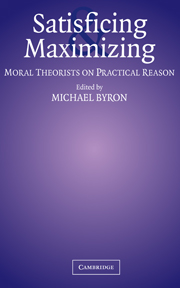Book contents
- Frontmatter
- Contents
- Contributors
- Introduction
- 1 Two Views of Satisficing
- 2 Satisficing as a Humanly Rational Strategy
- 3 Maxificing: Life on a Budget; or, If You Would Maximize, Then Satisfice!
- 4 Satisficing and Substantive Values
- 5 A New Defense of Satisficing
- 6 Satisficing: Not Good Enough
- 7 Why Ethical Satisficing Makes Sense and Rational Satisficing Doesn't
- 8 The Plausibility of Satisficing and the Role of Good in Ordinary Thought
- 9 Satisficing and Perfectionism in Virtue Ethics
- 10 Could Aristotle Satisfice?
- 11 How Do Economists Think About Rationality?
- Bibliography
- Index
4 - Satisficing and Substantive Values
Published online by Cambridge University Press: 04 December 2009
- Frontmatter
- Contents
- Contributors
- Introduction
- 1 Two Views of Satisficing
- 2 Satisficing as a Humanly Rational Strategy
- 3 Maxificing: Life on a Budget; or, If You Would Maximize, Then Satisfice!
- 4 Satisficing and Substantive Values
- 5 A New Defense of Satisficing
- 6 Satisficing: Not Good Enough
- 7 Why Ethical Satisficing Makes Sense and Rational Satisficing Doesn't
- 8 The Plausibility of Satisficing and the Role of Good in Ordinary Thought
- 9 Satisficing and Perfectionism in Virtue Ethics
- 10 Could Aristotle Satisfice?
- 11 How Do Economists Think About Rationality?
- Bibliography
- Index
Summary
Satisficing theories, whether of rationality or morality, do not require agents to maximize the good. They demand only that agents bring about outcomes that are, in one or both of two senses, “good enough.” In the first sense, an outcome is good enough if it is above some absolute threshold of goodness; this yields a view that I will call absolute-level satisficing. In the second sense, an outcome is good enough if it is reasonably close to the best outcome the agent could bring about; this leads to what I will call comparative satisficing. These two views coincide in their implications for a specific sort of case, in which the situation is now fairly far below the absolute-level threshold and an agent can at best bring it to a point somewhat above that threshold. Here both absolute-level and comparative satisficing say that one need not bring about the best available outcome, though of course one may; one is required only to improve the situation to the absolute threshold. But in other cases the views diverge. If the situation is now far below the absolute threshold and, no matter what, will remain below it, absolute-level satisficing requires agents to do everything they can to improve the situation; here its implications coincide with those of maximizing. But comparative satisficing is less demanding, requiring agents only to make some reasonable percentage of the largest improvement they can.
- Type
- Chapter
- Information
- Satisficing and MaximizingMoral Theorists on Practical Reason, pp. 71 - 76Publisher: Cambridge University PressPrint publication year: 2004
- 4
- Cited by

